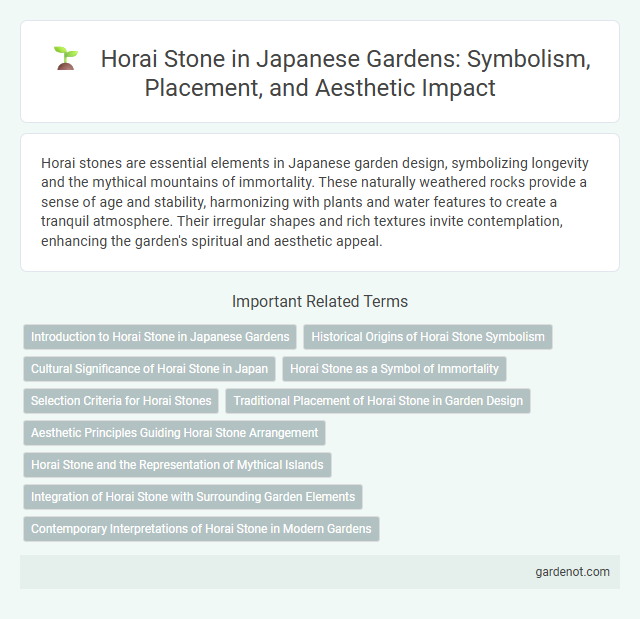Horai stones are essential elements in Japanese garden design, symbolizing longevity and the mythical mountains of immortality. These naturally weathered rocks provide a sense of age and stability, harmonizing with plants and water features to create a tranquil atmosphere. Their irregular shapes and rich textures invite contemplation, enhancing the garden's spiritual and aesthetic appeal.
Introduction to Horai Stone in Japanese Gardens
Horai Stone, a sacred element in Japanese gardens, symbolizes the mythical Mount Horai, a legendary island of immortality in East Asian mythology. This uniquely shaped stone is often placed strategically to represent longevity and spiritual harmony, serving as a focal point within the garden's design. Its presence enhances the garden's contemplative atmosphere, blending natural beauty with deep cultural significance.
Historical Origins of Horai Stone Symbolism
Horai stone, also known as "Horaiishi," holds significant symbolism rooted in Japanese garden design, representing the mythical Mount Horai from Chinese Taoist legend, which embodies immortality and eternal bliss. This stone's historical origins trace back to ancient garden aesthetics where it symbolized spiritual harmony and longevity, serving as a focal point to inspire tranquility within the garden space. The tradition of incorporating Horai stones in gardens reflects a cultural reverence for Taoist ideals and Japanese interpretation of sacred natural elements.
Cultural Significance of Horai Stone in Japan
Horai stone holds profound cultural significance in Japan as a symbol of longevity and immortality, often featured in traditional Japanese gardens to evoke the mythical Mount Horai, believed to be the dwelling place of immortals. This unique, naturally eroded granite stone is renowned for its distinctive, weathered appearance, embodying the aesthetic principles of wabi-sabi, which appreciates beauty in imperfection and transience. Garden designers incorporate Horai stones to create spiritual harmony and connect visitors with ancient Japanese folklore and Taoist philosophy.
Horai Stone as a Symbol of Immortality
Horai stone, also known as Horai stone, symbolizes immortality in Japanese gardens, representing the mythical island of eternal life from Chinese Taoist traditions. This rugged, weathered stone embodies longevity and spiritual endurance, often positioned prominently to invoke a sense of timelessness and harmony within the garden's design. Its presence aligns with the Japanese aesthetic principle of wabi-sabi, celebrating natural beauty and the impermanence of life through enduring symbolism.
Selection Criteria for Horai Stones
Horai stones in Japanese gardens are selected based on their natural weathering, unique texture, and symbolic shape that resembles mythical landscapes or islands. The stones should exhibit a rugged surface with a balance of rough and smooth areas, representing age and harmony with nature. Size, color, and compatibility with surrounding plants and water features are also critical criteria to enhance the garden's thematic and aesthetic coherence.
Traditional Placement of Horai Stone in Garden Design
Horai stones, symbolizing longevity and immortality, are strategically placed in Japanese gardens to enhance spiritual balance and aesthetic harmony. Traditionally, these volcanic stones are positioned near water features or at garden entrances to evoke the mythical Mount Horai, representing a sacred, timeless realm. Their deliberate placement follows principles of feng shui and natural flow, integrating with surrounding elements like moss, lanterns, and bonsai to create a serene, contemplative space.
Aesthetic Principles Guiding Horai Stone Arrangement
Horai stone arrangements in Japanese gardens adhere to aesthetic principles emphasizing natural asymmetry, balance, and the representation of mythical landscapes symbolizing longevity and immortality. These stones are carefully placed to mimic natural mountain formations, fostering a harmonious flow that encourages contemplation and spiritual tranquility. The arrangement reflects the wabi-sabi philosophy, celebrating imperfection and the transient beauty of nature.
Horai Stone and the Representation of Mythical Islands
Horai stone symbolizes the legendary island of Horai, a mythical paradise in Japanese folklore believed to grant immortality. These distinctive stones, often shaped by natural erosion, are carefully placed in Japanese gardens to evoke the mystical atmosphere associated with the island's eternal beauty and spiritual significance. Their inclusion reflects the deep cultural reverence for nature's harmony and the pursuit of transcendence in traditional garden design.
Integration of Horai Stone with Surrounding Garden Elements
Horai stone is carefully positioned to harmonize with the surrounding plants, water features, and pathways, creating a natural balance that enhances the garden's serene atmosphere. Its rough texture and unique shape contrast yet complement the smooth surfaces of moss and flowing water, embodying the Japanese aesthetic of wabi-sabi. This integration emphasizes both visual interest and symbolic meaning, making the Horai stone a focal point that invites contemplation within the garden's tranquil setting.
Contemporary Interpretations of Horai Stone in Modern Gardens
Contemporary interpretations of Horai stone in modern Japanese gardens emphasize its symbolic representation of longevity and mythical island landscapes. Designers incorporate polished or sculpted Horai stones alongside minimalist elements, blending traditional spiritual meanings with sleek, modern aesthetics. Innovative placements highlight the stone's texture and form, creating focal points that evoke serenity while respecting cultural heritage.
Hōrai stone Infographic

 gardenot.com
gardenot.com